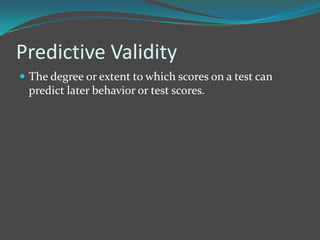Validity
- 2. ÔÇó The single most important characteristic of a test. ÔÇó The degree to which a test measures what it is supposed to measure.
- 4. Content Validity ÔÇó The degree to which test items match some objective criterion, such as content of a course or textbook, the skills to do a certain job, or knowledge deemed essential for some purpose. ÔÇó Usually established by comparing the knowledge, skills, and values tested by the test items and those covered in the syllabus/ course of study or textbook.
- 5. Construct Validity ÔÇó The degree to which a test measures an attribute or quality it is supposed to measure ÔÇó High when a test not only correlates with other measures with which it is supposed to correlate, but also fails to correlate with measures of the concepts, from which it is supposed to be different.
- 6. Predictive Validity ÔÇó The degree or extent to which scores on a test can predict later behavior or test scores.
- 7. Concurrent Validity ÔÇó The degree of relationship between scores on a test or scale and scores on another measure of established validity given at about the same time.







